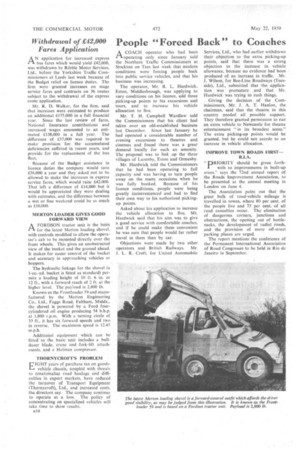People "Forced Back" to Coaches
Page 44

If you've noticed an error in this article please click here to report it so we can fix it.
A COACH operator who had been rTh.operating only since January told the Northern Traffic Commissioners at Stockton on Tees last week that modern conditions were forcing people back into public service vehicles, and that his business was increasing.
The operator, Mr. R. L. Hardwick, Eston, Middlesbrough, was applying to vary conditions on his licence, add three picking-up points to his excursions and tours, and to increase his vehicle allocation to five.
Mr. T. H. Campbell Wardlaw told the Commissioners that his client had taken over an old-established business last December. Since last January he had operated a considerable number of evening excursions to theatres and cinemas and found there was a great demand locally for such an amenity. The proposal was to link up the three villages of Lazenby, Eston and Ormesby.
Mr. Hardwick told the Commissioners that he had been operating to full capacity and was having to turn people away on the many occasions when he was fully booked. Because of his licence conditions, people were being greatly inconvenienced and had to find their own way to his authorized pickingup points.
Asked about his application to increase the vehicle allocation to five, Mr. Hardwick said that his aim was to give a good service with comfortable coaches, and if he could make them convenient he was sure that people would far rather travel in them than by car.
Objections were made by two other operators and British Railways. Mr. J. L. R. Croft. for United Automobile Services, Ltd., who had earlier withdrawn their objection to the extra picking-up points, said that there was a strong objection to the increase in vehicle allowance, because no evidence had been produced of an increase in traffic. Mr. J. Wilson, for Bee-Line Roadways (Teesside), Ltd., submitted that the application was premature and that Mr. Hardwick was trying to rush things.
Giving the decision of the Commissioners, Mr. J. A. T. Hanlon, the chairman, said that the theatre in this country needed all possible support. They therefore granted permission to run an extra vehicle to Newcastle for theatre entertainment "in its broadest sense." The extra picking-up points would be granted, but he could not accede to an increase in vehicle allocation.
IMPROVE TOWN ROADS FIRST- R.I.A.
PRIORITY should be given forthwith to improvements in built-up areas," says the 72nd annual report of the Roads Improvement Association, to be presented at the annual meeting in London on June 4.
The Association point out that the great bulk of road-vehicle mileage is travelled in towns, where 80 per cent, of the people live and 75 per cent. of all road casualties occur. The elimination of dangerous corners, junctions and obstructions, the opening out of bottlenecks, the development of radial roads, and the provision of more off-street parking places are urged.
The report mentions the conference of the Permanent International Association of Road Congresses to be held in Rio de Janeiro in September.


































































































